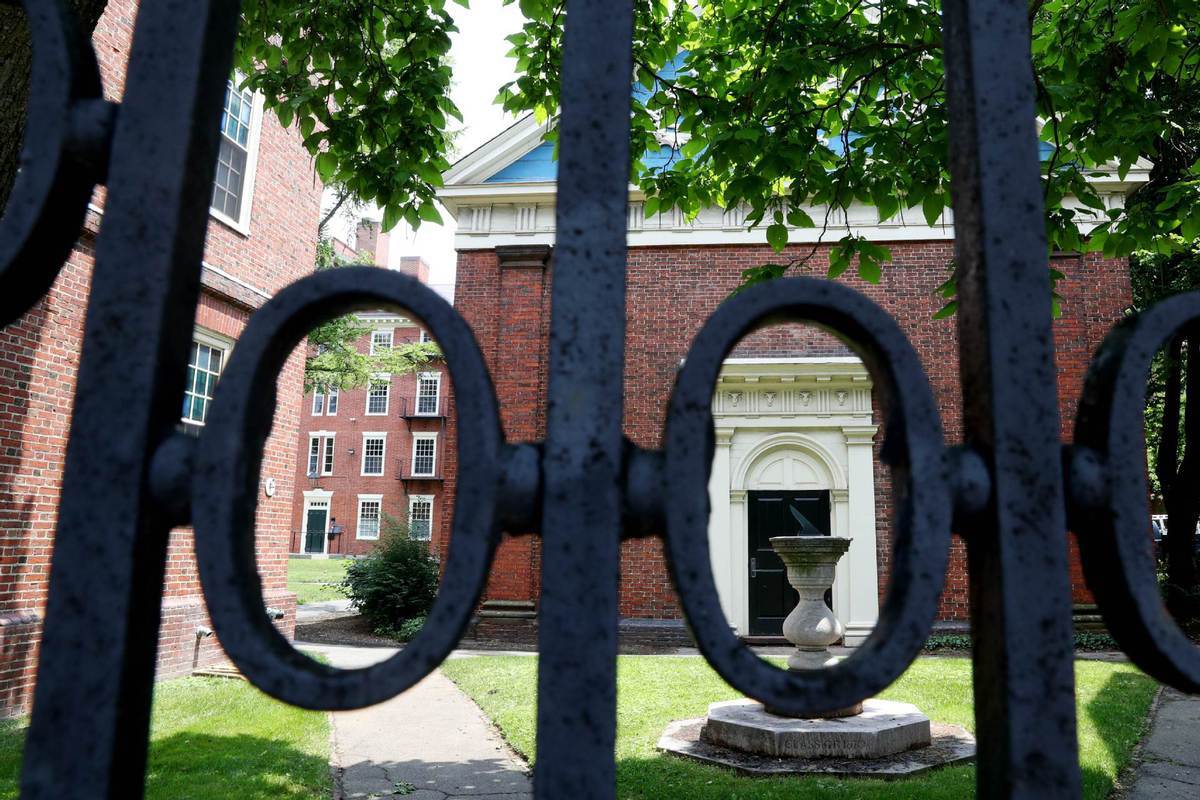Newcomers hoping to take courses that are all online told they will not get visa
International students have been dealt another blow after the Trump administration confirmed that foreign first-year students will be barred from taking classes fully online in the US.

A view of a gate to Harvard Yard on the campus of Harvard University on July 08, 2020 in Cambridge, Massachusetts. (Photo: Agencies)
Immigration and Customs Enforcement, or ICE, said on Friday that it would adhere to a directive in March that allows currently enrolled international students to take online classes in the US when the pandemic forced colleges to switch to virtual instruction.
The flexibility on virtual instruction does not apply to newly enrolled international students. ICE told school officials on Friday not to issue Form I-20, a document needed to apply for a student visa, to an international student in new or initial status who is outside of the US and says he or she plans to take all classes online.
The US recorded 68,212 new cases on Saturday, taking the total number of cases to 4,174,437, Johns Hopkins University reported in its real-time tally. Another 1,067 deaths were reported, taking the country's number of fatalities to 146,391.
The latest move on student visas by the Trump administration came after it issued a directive on July 6 to bar all international students from studying in the US through online classes and then rescinded it eight days later after a widespread backlash, including a string of lawsuits.
The new ruling excluding international first-year students from the visa flexibility immediately drew a backlash from US academia and international students, some of whom branded it "student ban round 2".
"They're no longer kicking out existing students, but now they want to ban new foreign students," said Michael Baym, assistant professor of Biomedical Informatics at Harvard University. "This is almost as bad as the last attempt at a student ban, and will have similar chilling effects."
John Helveston of the Department of Engineering Management and Systems Engineering at George Washington University, said: "As fully expected, ICE is doing everything it can to attack international students, again. Trump's student ban is still in full force."
Jenny Lee, a professor at the Center for the Study of Higher Education at the University of Arizona, warned of the policy's longer-term effect in going after first-year students. "First-year students are at the highest risk of dropping out-30 percent before the second year."
A student at New York University described on Twitter how the new rule gave her "the worst night of my life" when she scrambled to call her academic adviser and the international office on learning of the news.
"Only to find out it doesn't apply to me thankfully. But I'm still horrified about the xenophobia and coldness. When Trump is too busy banning international students to deal with the pandemic. When ironically, if he had handled the COVID-19 outbreak better, universities might have been able to open up (face to face) and the US wouldn't have a student ban."
The Trump administration's latest move came as little surprise to some universities and the American Council on Education, which expected the government to take a harder stand against new students than against those already in the country.
ICE's updated directive
On July 15 ICE issued an updated directive on international students saying that if prospective new international students "have not arrived in the United States, they should remain in their home country".
Harvard College Dean Rakesh Khurana wrote to all Harvard students on Tuesday telling first-year international students that they could not come to Harvard in autumn because the Trump administration has not changed immigration rules on online instruction.
Harvard offers only online instruction for the autumn semester because of "the unpredictability of current government policies and the uncertainty of the COVID-19 crisis".
"We abhor any policies that seek to force us to choose between our community's health and the education of our international students," Khurana said in the letter. "Unfortunately, we don't anticipate any change to the policy in time for the fall semester."
Likewise, the University of Southern California, which will move to online entirely for the autumn term, had recommended newly admitted international students stay home and complete their coursework online. The university said it was exploring legal options.
"Anything that even signals to international students that they are not welcome and that it is very hard to gain admission to the country is bad policy," the American Council on Education said. "The world's best students have numerous options where to attend school, and what this administration has been doing is shortsighted and self-defeating."
Various college consultancies from major rival countries such as Canada and Australia are promoting those countries' immigration opportunities and policy changes that are favorable to international students.
"While the Trump administration has enacted restrictions that will discourage international students, at the same time Canada has continued to adopt a more welcoming approach to such students," the National Foundation for American Policy said.
It predicted that the US enrollment of new international students in the coming academic year will fall by between 63 percent and 98 percent from the level of 2018-19. The decline of as many as 263,000 students represents the lowest level of new international students since after World War II.


